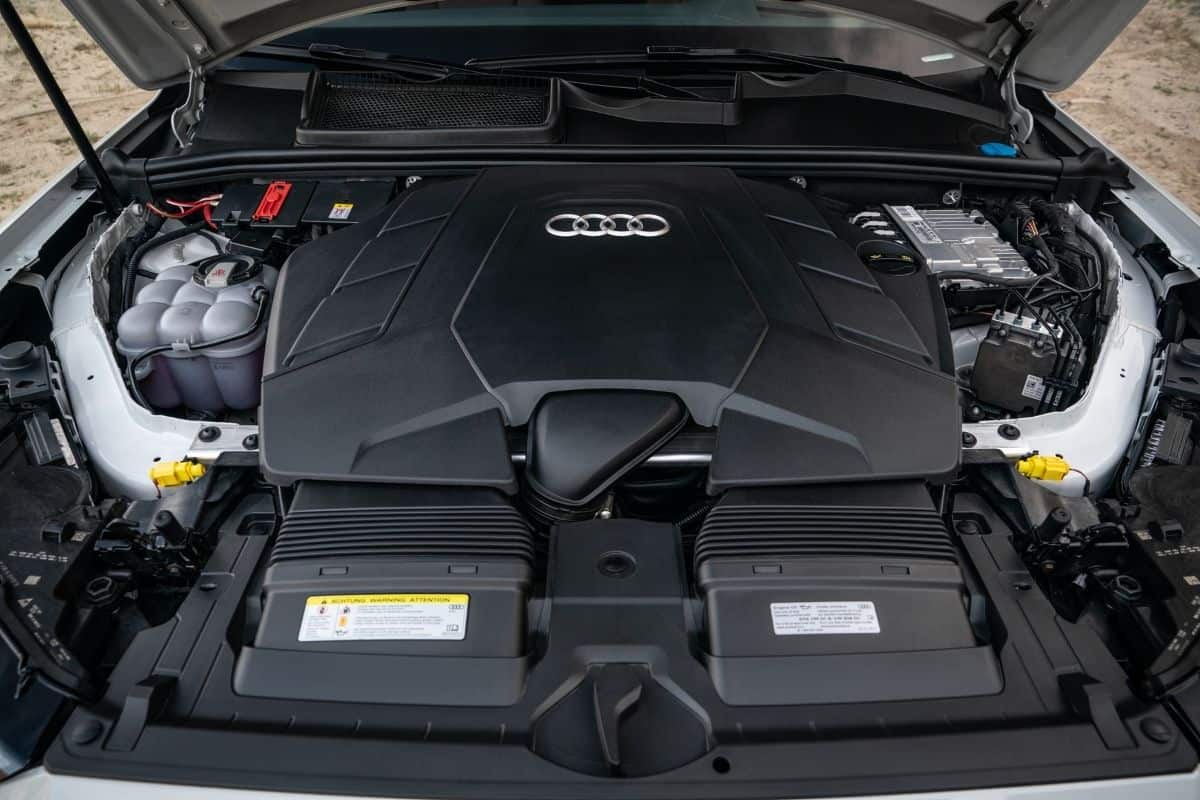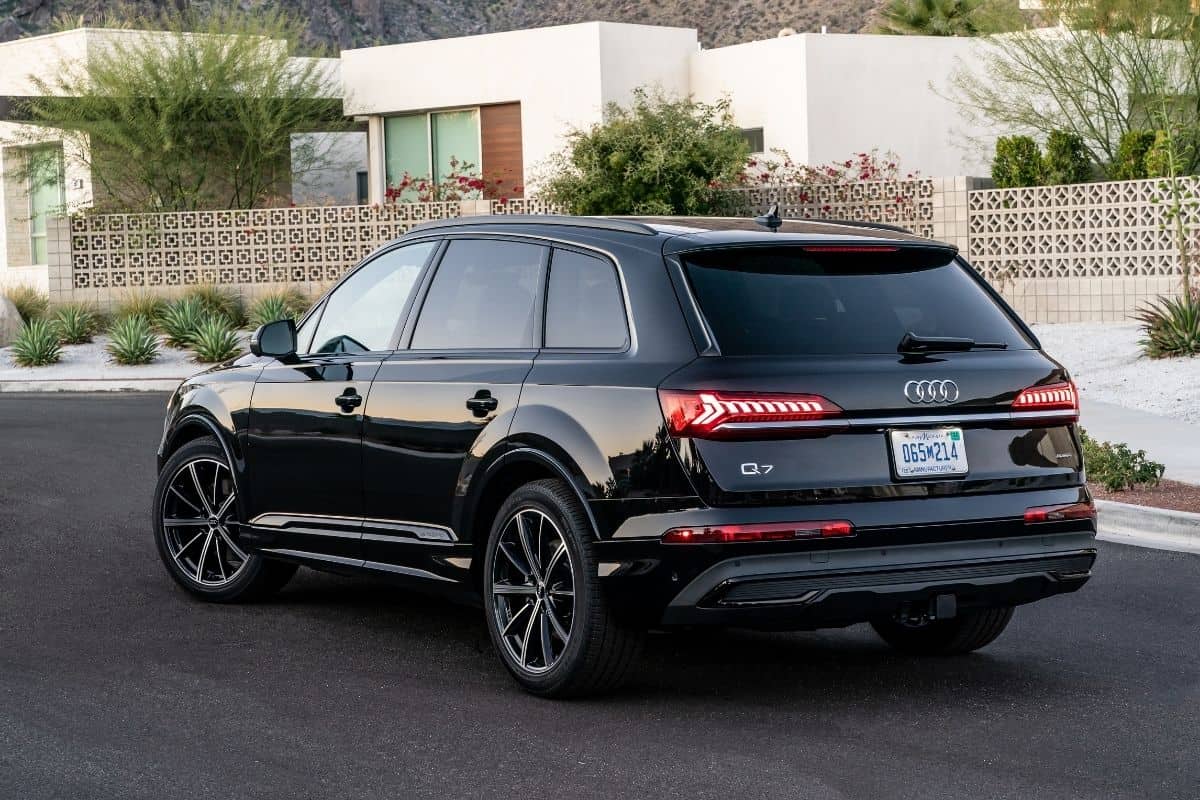What Goes Wrong with Audi Q7?
The Audi Q7 has several common problems associated with the engine and other parts. “Common problems include…” and “engine” are words no new SUV owner wants to hear.
A person does not have to be a rocket scientist to figure out that dragging an automobile with engine problems in for repairs a little too often will bring unwanted headaches and buyer’s remorse.
With that said, let’s see where the Audi Q7 fits into the framework of good, average, or poor choice for an automobile purchase.
What Goes Wrong with Audi Q7?

Audi Q7 suffers from several problems, chiefly the ignition coil pack and spark plug failure, knock sensor failure, worn Constant Velocity (CV) boots, and squeaky brakes.
Some of the problems are not major. Others have led to lawsuits that have caused Audi to change their terms of service.
The Q7 dates back to 2005, so Audi has had plenty of time to sort out the kinks, but problems persist. The reliability of the Q7 is not horrible. The SUV’s reliability score rates as mediocre.
Let’s take a closer look to see whether or not this Audi is worth buying.
How Reliable Are Audi Q7 Engines?
Before digging into the reliability of these engines, let’s take a look at different engines the Q7 has had over the years. Some have a supercharger, which makes a big difference to the output.
Here is what they did:
- The First generation (Type 4L: 2005)
- Audi started with a 3.6 FSI Quattro engine with 276hp and 266 lb-ft of torque and a 4.2 FSI Quattro with 345hp and 325lb-ft of torque. These engines lasted until 2011, when Audi switched to supercharged engines.
- They used a base 3.0 TFSI supercharged engine with 268hp and 295lb-ft of torque. The S-Line 3.0 TFSI offered 328hp and 325lb-ft of torque.
- TDI Diesel Engines
- The Type 4L, had three first-gen diesel engines: 3.0 TDI Quattro, 4.2 TDI Quattro, and a 6.0 TDI Quattro.
- The Second generation (Type 4M; 2015)
- There are quite a few second-gen engines, both in gasoline and diesel. Starting with gasoline:
- 45 TFSI with 249hp and 273lb-ft of torque,
- 3.0 TFSI Supercharged with 329hp and 325lb-ft of torque
- 55 TFSI with 340hp and 332lb-ft of torque
- Hybrids:
- 2.0 TFSI e-tron with 362hp and 520lb-ft of torque
- 55 TFSI e with 376hp and 443lb-ft of torque
- 60 TFSI e with 450hp and 516lb-ft of torque
- The Special SQ7 (from the factory):
- V8 twin-turbo gasoline engine with 500hp and 568lb-ft of torque
- Diesel:
- 3.0TDI ultra with 215hp and 369lb-ft of torque
- 45 TDI with 228hp and 369lb-ft of torque
- 3.0TDI with 268hp and 443lb-ft of torque
- 50 TDI with 282hp and 443lb-ft of torque
- Hybrid:
- 3.0 TDI e-tron with 382hp and 516lb-ft of torque
- The Special SQ7 (from the factory):
- V8 twin-turbo diesel engine with 429hp and 664lb-ft of torque.
- There are quite a few second-gen engines, both in gasoline and diesel. Starting with gasoline:

Common Audi Q7 Engine Problems
Bad news for Audi and fans of these automobiles, four common problems have plagued owners. The repairs do not necessarily break the bank.
However, new vehicles cost a lot of money, and nobody expects to have the engine light come on when a well-maintained automobile is not old yet.
Ignition Coil Pack and Spark Plug Failure
These two issues plague both Audi and Volkswagen engines. The battery delivers voltage to the ignition coils which, in turn, send voltage to the spark plugs. Without spark plugs, the engine cannot run. The spark creates the combustion to drive the pistons.
Cold weather seems to accompany a buck and shudder problem while driving after starting the engine cold. Unfortunately, mechanics tend to have problems finding the issue and fall back on tried and true methods such as valve cleaning to fix the problem.
The cleaning often does not fix the problem, so mechanics try installing new spark plugs and coils, which also does not tend to address the real problem. Naturally, these problems lead to buyer’s remorse.
However, a few people managed to fix these issues by updating the software for the power control module. The 2007 and 2011 Q7 models seem particularly vulnerable to this problem.
Knock Sensor Failure
Many Q7 owners have found out that their Check Engine light came on because of a malfunction with the knock sensor. Luckily the light coming on seems to be the extent of the malfunction in most cases.
A knock sensor malfunction leads to poor acceleration and engine damage. The 2007 to 2012 Audi Q7 seems to have suffered the most from the sensor malfunction.
To fix the problem, a new knock sensor installation, along with the bracket that holds the sensor in place, is the way to go. To prevent further issues, also protect the sensor with heat shielding.
Worn Constant Velocity (CV) Boots
Owners report CV problems in Q7s, but the CV is not the most common problem. The issue exists nonetheless.
The CV boot holds the grease for the axle joint to assure proper lubrication and constant velocity.
When the problem does occur, Q7 owners have seen the CV boot crack and rip open, sending debris into the axle joint. The whole powertrain suffers as a result.
As long as the terrain the vehicle goes over is not too rough, CV boots should last the duration of the vehicle’s life. A visual inspection is easy by inspecting the axle. Listen for clicking noises while turning and look for faulty clamps, ripped rubber, and leaking grease.
If any of these problems occur, the only fix is to replace a CV boot. The cost is not too high.
Squeaky Brakes
Squeaky brakes do not amount to faulty brakes, but they are annoying. While some people might refer to an annoying sound as a first-world problem, an expensive Audi should not go around squeaking nonetheless.
The squeaking issue happens at any speed, and Audi’s response is, “we’re looking into it.” The 2017 Q7 is the most notorious for having squeaky brakes and led to owners suing Audi. Audi doubled down and claimed the brakes still work, so they do not suffer from a defect.
Audi decided to settle but tried to save some face by still insisting the Q7 was not defective. As a result of the lawsuit, Audi went as far as to change the Terms of Service so that one of the common problems has to arise within the first 50,000 miles or four years, whichever comes first.
Fifty thousand miles is not much, and many car owners start having common problems after that mark. If the defect arises in time, Audi has learned to install an extra spring to each caliper after replacing the brake pads.

Is the Q7 Worth Buying?
While the Audi Q7 has not had all good years, the SUV has not had all bad years either. I think this SUV works for people who do not need true SUV power, like other brands offer, and can handle the cost of repairs.
For people who need performance and reliability, the Q7 is not a good choice.
How Has Audi Weathered the Storm?
Not well, unfortunately. At times Audi has taken stances such as they did with the squeaky brakes and claimed a problem is not a real problem because, technically, the parts work.
Customers pay hard-earned money for an expensive product. Telling them that they have the wrong opinion about a problem and should look at the issue from another point of view does not win people over.
Sources:
